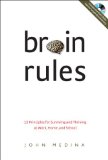
Wednesday, January 7













|
Home > Leadership in the Real World Blog | |
|
Notes, links, and inspiration about topics related to personal and leadership development. |
|
|
| |
Death By PowerPoint (or video or....)I know, I know... everybody knows that PowerPoint is all too often abused. Though we are aware of the crime, death by PowerPoint remains way too commonplace in everyday corporate life. This slide show at CIO Magazine's website is a good reminder for us all. John Medina's book Brain Rules: 12 Principles for Surviving and Thriving at Work, Home, and School does a great job of explaining why good slide manners matter. Get his book, but also check out the "Vision" video on his website. John Medina's book Brain Rules: 12 Principles for Surviving and Thriving at Work, Home, and School does a great job of explaining why good slide manners matter. Get his book, but also check out the "Vision" video on his website.My observation: the problem isn't just poor slide design. It often starts with a misunderstanding of how to architect an effective message. I watched a video that a friend posted on YouTube to talk about a company that his organization will be partnering with in 2010. It wasn't clear to me whether he was targeting the video for existing customers, prospective customers, or people who want to buy into his franchise idea. On Monday Night Football this week, IBM paid hundreds of thousands of dollars to show a couple of their Smarter Planet ads, such as this one. Though I find the ads intriguing, it led to an equally intriguing discussion with some friends and family: what is it that IBM actually does these days? I could answer that 25 years ago. Today? I'm not as sure. To whom are they targeting that ad? Is it worth the cost? The smart minds behind the Smarter Planet initiative clearly think so. I'm not as convinced, based on the discussion around our munchies Monday evening. My point: whether it's a presentation, a video, an e-mail, a marketing piece, or any other communication, start with the basics: who is my target audience and which of their problems am I addressing? How can I best communicate how we address those problems? If you can't clearly answer those initial questions, it really doesn't matter how slick (or sick) your PowerPoint slides (or video or....) looks. The message will get lost in the fog. Do you have a favorite abuse of PowerPoint (or video or web page or....)? Send me a pic or link! Here's to your success communicating today! Labels: communication, influence, marketing, presentations
| |
"Trillion is the new billion"It's a key message in my book Navigating the Winds of Change: Staying on Course in Business & in Life: Perspective matters.It's so easy to lose perspective. Whether you're trying to convince a boss to make a change or trying to evaluate if a government reform idea is a good deal or not, getting a sense of perspective can make all the difference. Frankly, I have trouble visualizing a trillion of anything. As reported this last week, the White House predicts a deficit of $1.841 trillion dollars for the current fiscal year. Seems like a really big number. To get some perspective, how does that compare to some previous years? The biggest deficit for any fiscal year on record is $454.8 billion, rung up in fiscal 2008. So we're predicting to be $1.4 trillion dollars worse than the worst year on record. Yet as bad as that sounds, I still find it difficult to get my arms around how big a trillion really is. Often a picture can serve up perspective more effectively. Here are a couple examples that illustrate a trillion dollars:
This posting is not about whether health care reform or stimulus spending is a good idea or not. It's not about left vs. right or Republicans vs. Democrats. Here's my point: when you hear any leader (whether in government or in business) throwing around numbers that are difficult to comprehend, try to get perspective using a picture. It will help you better evaluate the long-term implications of their statements. Labels: accountability, communication, culture, illusion, integrity, managing change
| |
What I "Can" Do There are times when saying 'No' seems like a career-limiting move. Yet a clear personal productivity principle is learning to say 'No'. There are times when saying 'No' seems like a career-limiting move. Yet a clear personal productivity principle is learning to say 'No'.Easier said than done. I often cover this topic in our project management and leadership development workshops. Here's a link to my article "How to Say 'No' (Without Saying 'No')" that provides some helpful advice. In addition, here's a piece from Rachel Zupek for your consideration as well. I like her focus on "What I can do..." as well as the coaching on watching your body language and vocal tone. Clearly there are times when "No" needs to be the answer (for example, when asked to do something illegal, unethical, or against your value system). Yet some people err on the side of over-using "No" when there may be better ways to finesse the same result. Ultimately, we need to be known as people who deliver--who make things happen. That will often happen by saying "Yes" to opportunities. But when "No" is really the best answer, it's helpful to be armed with techniques that can help you influence a "No" without always using the letters N-O! Labels: communication, influence, managing stakeholders, managing up, time management
| |
Service to Shout AboutThis is not normal. I'm yelling at a customer service rep from GiftCards.com. I don't yell at people--at least very often.
Labels: communication, conflict, customer service
| |
Spell Checker is Not Always Your FriendI was in Milwaukee delivering a project management workshop on Monday. During a break, one of the participants just started roaring with laughter.He was reading his e-mail. I wondered, "What could be so funny? " He told me, "I just got a message from a co-worker asking for help. Instead of saying 'sorry for the inconvenience' the e-mail reads 'sorry for the incontinence!" The curse of spell checker/auto-complete strikes again! Potential actions Consider re-reading your e-mails today before hitting the Send button. Pay close attention when having the computer automatically fix your spellings. Double-check that presentation you're sending to your project sponsor or key stakeholder. I wouldn't want it to cause you any incontinence!  An extra minute of review now can save much more time later in confusion or embarrassment. An extra minute of review now can save much more time later in confusion or embarrassment.For advice on issues like this, check out my e-book How to Organize Your Inbox & Get Rid of E-Mail Clutter. Labels: communication, e-mail
| |
"Could I have a translator for what this IT guy said?"If you're not an Information Technology (IT) professional, you probably have to work with one. A common complaint about communication across organizational boundaries is the use of jargon, and the IT people I interact with are often guilty of this communications sin. According to the results of a survey conducted by IT recruitment consultancy Computer People, 75 percent of respondents admitted that they waste over an hour a week finding out what something means so they can complete their work. According to the results of a survey conducted by IT recruitment consultancy Computer People, 75 percent of respondents admitted that they waste over an hour a week finding out what something means so they can complete their work.For the record, that seems like an exaggeration to me (but then again, I grew up as an IT guy). Regardless we can all use a reminder to be careful with the jargon that we inadvertently insert into our written and spoken communications. Potential actions Consider re-reading your e-mails today before hitting the Send button. Double-check that presentation you're sending to your project sponsor. Do they really understand the metrics?  An extra minute of review now can save much more time later in confusion or poor decisions. An extra minute of review now can save much more time later in confusion or poor decisions.For advice on how to use e-mail more effectively, check out my e-book How to Organize Your Inbox & Get Rid of E-Mail Clutter. Labels: communication, e-mail, managing stakeholders, project sponsors
| |
What Not To Say: E-mail EditionI continue to be amazed by the e-mail horror stories I hear as I intersect with companies around the world. As they say, "Guns don't kill people. People kill people." The problem isn't e-mail. The problem is we often aren't sufficiently thinking before hitting "Send."Though this list of "10 Things You Should Never Write in an E-Mail or Instant Messsage" may seem obvious, it's a good reminder to think before you send.  Do you have an e-mail story worthy of a Darwin Award? I invite you to share your story in the Comments. Do you have an e-mail story worthy of a Darwin Award? I invite you to share your story in the Comments.Also, I invite you to get a copy of our e-book entitled How to Organize Your Inbox & Get Rid of E-Mail Clutter. You'll get helpful insights to tame the e-mail monster for less than $10 USD. Labels: communication, e-mail
| |
The Cost of a TypoI'm sitting across the table from one of my strongest performers. He's a talented software developer who can write code like few people I know. But there is a problem.The kid can't spell to save his life. Whether it was a one paragraph e-mail or a voluminous requirements document, you could count on typos if it had his name as the author. I talked to this otherwise strong performer about his spelling problem. He discounted it at first as an issue that is no longer relevant, particularly in the age of e-mail and instant messaging. I'm not insensitive to the argument. A friend who is a high school English teacher recently told me she is getting papers submitted where the word "you" is spelled "u." But I don't buy the excuse. What comes to mind when you sea a typo? Certainly plenty of people may not even notice a single typo (did you catch the one I purposely put in this posting?). Yet others will see it as a sign of laziness. In some cases the writer may be perceived to be less intelligent. It can even come off as disrespect and cost you money (not to mention getting your name published in the New York Times)! Here are my recommendations on how to mitigate the risk of typos:
When you're looking for extra eyes on your communication, consider turning to my colleague Leila Kalmbach of Eye for Ink Editorial Services. From copyediting to proofreading, Leila specializes in making us all look brilliant. Contact Leila to subscribe to her Typo of the Month newsletter! Labels: communication, recommended sites |
|
|
